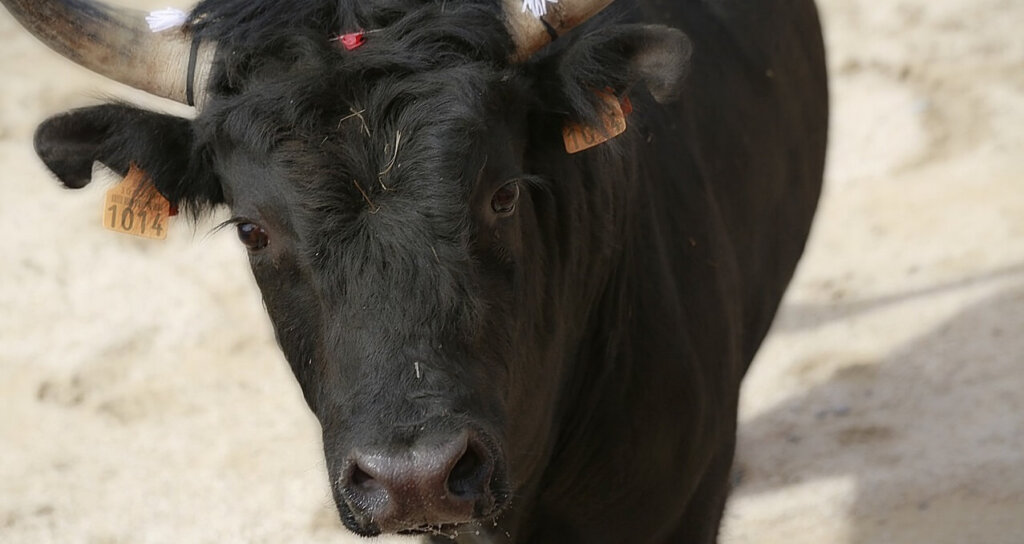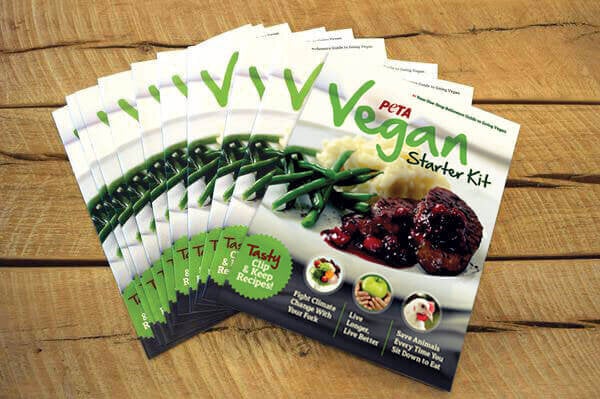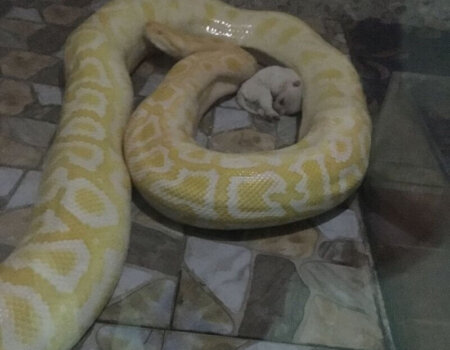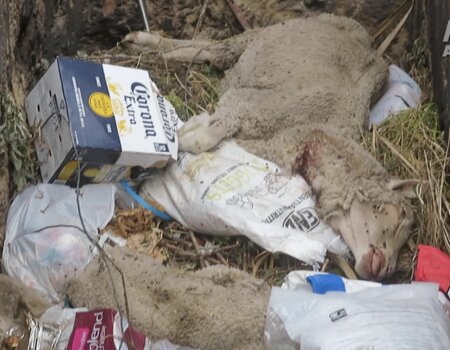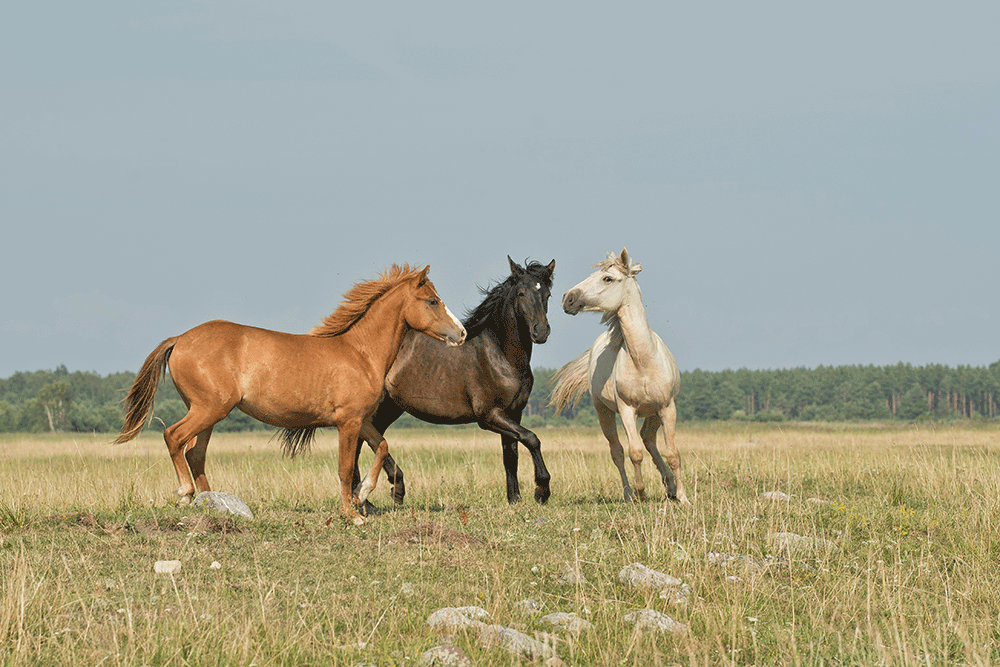
80 Reasons to Go Vegan This World Vegan Month
November is World Vegan Month, and this year, it’s extra special because it marks 80 years since animal activist Donald Watson coined the word “vegan” to describe a way of living that excludes animal exploitation.
Since then, we’ve come a long way. There’s more vegan food and fashion than ever, and advances like the Research Modernisation Deal – a roadmap for removing animals from laboratories – make it easier than ever to be kind to all kinds.
From helping the planet to healing our bodies, being vegan is about much more than who you eat.
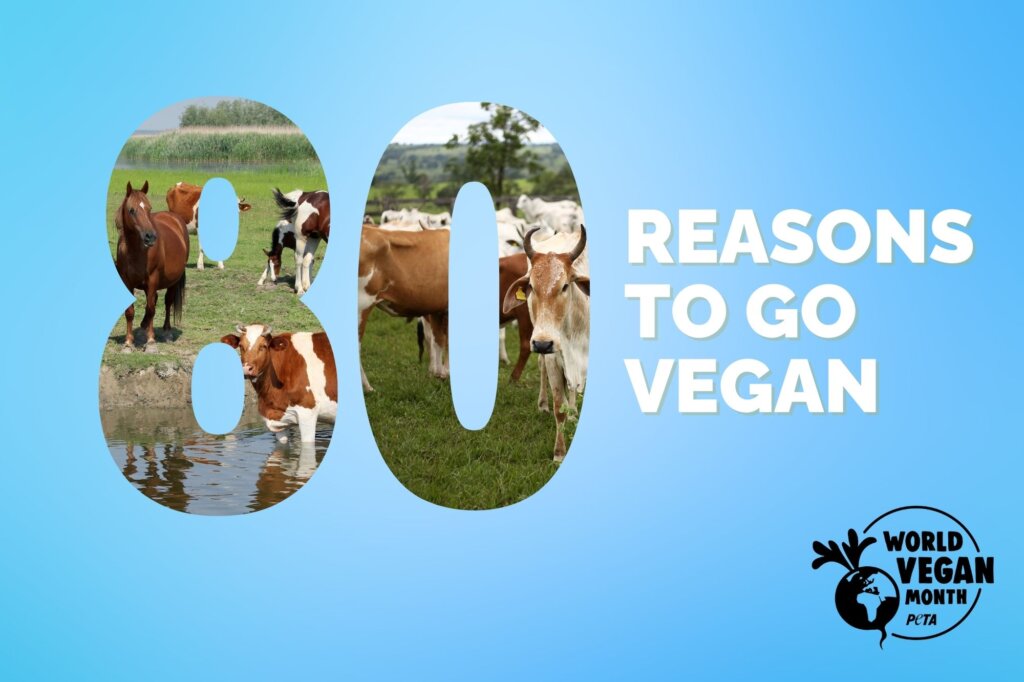
Here are 80 reasons to go vegan.
- Animals are sentient individuals. Like humans, other animals experience emotions and can feel physical pain, and each has a distinct personality.
- We must fight climate change. Farming animals is responsible for 65% of the world’s nitrous oxide emissions, which have a warming impact 296 times greater than carbon dioxide.
- Gambling on animals kills. Last year in Australia, 151 horses and 118 greyhounds died on racetracks. Betting on animals’ lives condemns them to a life of suffering, injury, and often an early death.
- Going vegan can help address world hunger. We already produce enough food to feed 10 to 14 billion people, but over a third of our crop calories are fed to the animals we eat.
- Humans suffer in slaughterhouses, too. The rate of injury and illness for workers in the Australian meat industry is four times the national average, and workers report high rates of depression, PTSD, aggression, and anxiety.
- Speciesism is silly. The lines we draw between humans and other animals – and between different species – are imaginary. Logically, there’s no reason to treat a pig any differently from how we’d treat a dog.
- Wool isn’t “natural”. Sheep are genetically mutated to grow more wool than they need. As lambs, they endure painful mutilations, like live cutting – usually without pain relief.
- Leather is toxic. Chrome tanning, which uses chemicals like chromium, arsenic, lead, and others, is used for 90% of leather, making workers ill and polluting waterways.
- There’s a homeless-animal crisis. There are 328,000 homeless cats and dogs in Australia alone. Buying companion animals from pet stores and breeders adds to the problem.
- Bodily autonomy is for everyone. Female animals bred for food are repeatedly, forcibly subjected to artificial insemination, and male animals are forced to ejaculate through human manipulation or electric shock.
- Vegan living can help fight cancer. Red and processed meats are recognised carcinogens, whereas plants are rich in phytochemicals, which your immune system needs to fight diseases like cancer.
- You can Free Willy. Marine animals confined to tanks at places like Sea World Marine Park Gold Coast are denied everything important to them. Dolphins can swim more than 100 kilometres per day in the ocean, but at abusement parks, they’re kept in tiny concrete pools and forced to perform demeaning tricks, sometimes while a human holds their delicate dorsal fins.
- Animal agriculture holds no future for farmers. The climate catastrophe – for which animal agriculture is largely responsible – will eventually cause farmers to fail. We must invest in plant farming now to help families future-proof their livelihoods.
- Eggs hurt hens – and male chicks, too. Around 19 million hens in Australia are exploited for eggs annually. Most spend their entire lives in intensive confinement (including on misleadingly named “free-range” farms). Because they can’t lay eggs, male chicks born into the egg industry are killed, usually via maceration (being ground up alive).
- It’s easy to be vegan! There are more vegan products in supermarkets, dishes on menus, and recipes available than ever before, meaning it’s a no-brainer to choose kindness in any situation.
- Animal agriculture is thirsty. Those eating only vegan foods use 54% less water than those with meat-heavy diets.
- Feathers are as cruel as fur. Birds exploited for their feathers are factory-farmed and either painfully live-plucked or violently slaughtered and then plucked. Investigations into ostrich-slaughter companies in South Africa reveal egregious cruelty to birds used for their feathers.
- Wild-animal skins are nasty. Nailed to trees, bludgeoned, skinned alive – snakes, ostriches, lizards, alligators, and crocodiles suffer immensely for the wild-animal skins used by fashion brands like Hermès and Louis Vuitton.
- Plants can help you avoid heart disease. Swapping daily processed meat for daily nuts or legumes has been found to lower the risk of cardiovascular disease by 25%.
- Fishing generates carbon emissions. Aside from dredging the seabed and killing animals, fishing trawlers generate about one gigaton of carbon dioxide annually, almost the same as the entire aviation industry.
- Discarded fishing nets are deadly. Everyone is happy to ditch straws, but 640,000 tonnes of discarded fishing gear enter our oceans yearly. Aside from contributing 10% to 50% of marine plastic,this “ghost gear” continues killing animals.
- Animals’ mental health suffers in captivity. Animals trapped in cages in exhibitions or trucked around the nation in petting zoos suffer from zoochosis, a psychological disturbance indicated by behaviour like pacing, feather pulling, self-mutilation, swaying, and spinning in circles.
- Animal testing is bad science. Aside from being cruel, animal experimentation impedes scientific advances. Over 90% of “highly promising” basic science discoveries – most of which are based on animal studies – fail to enter clinical use within 20 years, wasting time and money and holding us back from finding health solutions.
- Meat production contributes to wild weather events. Increased bushfires, storms, flooding, and heatwaves all arise from climate change, to which methane and other emissions from animal agriculture are a large contributor.
- Animals killed for their flesh are mere babies. Cows used for dairy are slaughtered at 4 years old. Chickens are just 5 to 7 weeks old and pigs and lambs are around 6 months old when they’re killed for their flesh.
- Eating vegan can help you lose weight. Research shows that people who eat vegan tend to have a lower body mass index.
- Vegan meals can be easier on your wallet. Whole food staples like beans, rice, and vegetables are often cheaper than meat, eggs, and dairy and can reduce food costs by as much as a third!
- The Amazon rainforest is at stake. Cattle ranching for beef and leather is responsible for 80% of the deforestation of Brazil’s precious Amazon rainforest.
- Beef production is damaging the Great Barrier Reef. Climate change, driven by meat production, is warming reefs and causing coral deaths. Runoff from Queensland’s beef farms is also bleaching the Great Barrier Reef.
- Vegans enjoy lower blood pressure. Research shows that vegan eating is linked to lower blood pressure and better cardiovascular health outcomes than animal-based diets.
- Avoiding animal-derived foods can boost sex drive. Studies show those who don’t eat animal-derived foods enjoyed a 383% rise in libido and that eating vegan improves erectile function.
- Plants help clear the air. If the world went vegan, the number of premature deaths from air pollution could fall by more than 200,000.
- Animal agriculture causes deforestation. The Amazon isn’t the only place being decimated for meat. Australia is the only developed nation to be classed as a deforestation hot spot, with most tree felling occurring to make room for animal farming.
- Wool is not “just a haircut”. Hours of eyewitness video footage – gathered in 117 wool-industry operations on four continents, including in Australia – reveal that workers in the wool industry beat, stamp on, kick, mutilate, and throw sheep around in shearing sheds.
- It’s a way to be morally consistent. No one wants to be a hypocrite. When we say we’re against cruelty to animals, we must apply that to all animals. If dogs and cats were subjected to the same abuse as animals in our food system, we’d be rightly horrified.
- It’s a way to help bees. Bees farmed for their honey are given an unhealthy sugar substitute when their honey (which they make to feed themselves) is taken away, and they’re selectively bred to increase productivity. This heightens the risk of disease, which can spread and decimate wild bee populations.
- Animal agriculture gobbles up land. Even though animal-derived foods provide only a small share of the world’s protein and calories, more than three-quarters of global agricultural land is used to raise the animals who are killed for them. Talk about inefficient!
- It’s a way to oppose racism. In his groundbreaking documentary They’re Trying to Kill Us, filmmaker John Lewisreveals the link between the animal-based food system and systemic racism in America.
- It’s the future. Killing animals for their flesh and skin is unsustainable and archaic. Conversely, vegan pioneers are forward-thinking, harnessing innovations like 3D-printed proteins, vertical farming, fermentation, and cell-based meat.
- It’s a way to support Indigenous rights. Colonialism is built on the commodification of others. Refusing to support the commodification and oppression of any individual is to reject that system.
- Veganism is feminism. Female animals are used as egg, milk, and baby-making machines. Their reproductive cycles are manipulated and exploited, and they are killed and consumed.
- Vegan living compliments spirituality. Christians believe “thou shalt not kill”, while Buddhists believe that animals seek to avoid suffering. Whatever you practise, not harming others is intrinsic to most religions and spiritual beliefs.
- It’s a way to help endangered animals. Already, 67 wildlife species and 37 plant species have disappeared in Australia. Koalas are now listed as endangered in Queensland, New South Wales, and the ACT due mainly to habitat destruction to make room for sheep and cattle.
- It’s good for your gut. Research shows a reduction in inflammatory gut bacteria and an increase in the protective species of bacteria in vegans. Increased fibre also means less time on the toilet. (You’ll have to watch TikTok videos elsewhere!)
- Fish have feelings. It’s well established that fish can feel physical pain, but they also have rich social and emotional lives. Fish can recognise individuals and use tools. Some even make beautiful art to woo a prospective mate.
- It can help those at risk of diabetes. Research suggests that eating vegan can help reduce blood sugar levels in individuals with or at high risk of type 2 diabetes.
- Factory farms breed deadly pandemics. Keeping animals in crowded sheds where they stumble over corpses and stand in their own waste is a recipe for creating pathogens. These can spread to humans and cause pandemics. Bird flu and swine flu are warnings: we must stop breeding animals for food.
- Meat means live export. An overwhelming 75% of Australians oppose live-animal export, but animal agriculture feeds this industry. When sheep raised for wool can no longer produce enough fleece, they’re shipped overseas to be slaughtered.
- Your kids will thank you. Earth is the only planet our children can inhabit. By choosing to live vegan, you’re helping to protect the environment into the future.
- You’ll gain peace of mind. Living vegan is a way to align your actions with your values. If you love animals but also eat them, you’ll always feel conflicted.
- It’s your chance to challenge commodification. Living, feeling beings are not items or “stock” to be traded and used. Emancipating sentient individuals from being considered property is at the heart of all freedom movements.
- It’s more inclusive. Whether your friends and family have an egg or dairy allergy or faith-based dietary requirements, you can cater for them all, as everyone can enjoy vegan food.
- It can help you change hearts and minds. Living as a vegan inspires others. You can make a difference by simply leading by example.
- Vegan eating opens up a world of creative cooking. Don’t just char the body parts of the same four animals. Make meringue from a can of chickpeas, scramble some tofu, and turn cashews into cheese. Vegan cooking is inventive!
- Vegans defend motherhood. It’s not only humans who bond with their babies. When female animals are used for their body parts, their young are consistently taken from them to be killed for meat or intensively bred themselves. Many grieve loudly for days.
- Avoid gross stuff and euphemisms. It’s weird and gross to handle and consume rotting flesh, stuff a turkey, and remove the eyes and intestines of prawns. Vegans avoid all that – and don’t have to use cute euphemisms to get kids to eat their animal friends!
- Baby cows aren’t waste products. In the dairy industry, newborn calves are separated from their mothers so humans can drink the milk meant for them. These calves are considered surplus. Some used for veal will be slaughtered before they’re a year old, but most will be killed within days.
- It can help keep cholesterol in check. Researchers from the University of Oxford concluded that vegans have lower cholesterol levels than those who consume animal-derived products.
- You can get all the nutrients you need. The Australian Dietary Guidelines state that “appropriately planned vegetarian diets, including total vegetarian or vegan diets, are healthy and nutritionally adequate”.
- Meat means antibiotic resistance. An estimated 66% of the world’s antibiotics are given to farmed animals to counter the filthy conditions in which they’re raised. This systematic overuse makes them less effective in humans.
- Rats (and other animals) display empathy. Rats can recognise pain on the faces of others, sheep wag their tales when they’re happy, and crows give gifts to those they appreciate. Animals are amazing – we just have to take the time to get to know them.
- You’ll drink fewer white blood cells. Yep, you read that right. In Australia, dairy milk can legally contain 400,000 somatic cells (white blood cells) per millilitre. High somatic cell counts usually indicate the presence of a mastitis-causing pathogen (infection of the udder).
- Pigs are forced into gas chambers. To slaughter enough pigs to meet Australia’s demand for bacon, the industry gasses them en masse. Pigs are lowered into carbon dioxide gas, which they inhale, thrashing and screaming as their lungs and throats burn before they eventually lose consciousness.
- Animals are mutilated on farms. Chickens’ delicate beaks are cut off, and lambs’ and pigs’ tails are severed in the farming system.
- Factory farms harm humans, too. Higher rates of bronchitis, asthma, other lung concerns, and certain types of cancer have been recorded in those working on and living near factory farms.
- Vegans help dismantle the illegal wildlife trade. Wild animals are at risk of being poached by trophy hunters or to be eaten, sold as companion animals, or used for their skin. By refusing to buy anything from an animal, you can avoid funding this trade.
- You’ll attract more empathetic people. Many compassionate vegans will only date other vegans. If you’re looking for someone with a big (and healthy) heart, you might just find them in the produce section.
- Being vegan helps the oceans. Fishing is destroying the oceans, and agricultural runoff from factory farms and other industry practices creates ocean dead zones (areas where a lack of oxygen means lifeforms can’t survive), which are exacerbated by global heating. Additionally, commercial fishers kill millions of tonnes of non-target marine animals, including whales, dolphins, sea birds, and turtles, each year.
- You can boost your athletic performance. As the impressive documentary The Game Changers, starring Jackie Chan, Lewis Hamilton, and Arnold Schwarzenegger, proved, eating vegan is a shortcut to peak athletic performance.
- The leather trade uses child labour. A five-year study of Bangladesh’s leather industry revealed children working in dangerous and harmful conditions at every stage of leather processing and production.
- Slaughterhouses breed violence. A study found that slaughterhouse workers – likely due to being exposed to trauma and being required to commit violence at work – had a higher propensity for aggression and physical abuse than the general population, akin to incarcerated populations.
- You’ll be on the right side of history. As author Paul Watson said, “If you want to know where you would have stood on slavery …. Look at where you stand on animal rights.” From the suffragettes to the abolition of slavery, movements against oppression make history.
- Demand is how we change the world. It’s easy to feel overwhelmed and helpless when looking at today’s injustices and global challenges. Going vegan is an easy but powerful way to be the change you want to see in the world.
- Fur factory farms are horror shows. Investigations into farms holding minks, foxes, chinchillas, and others have found animals confined to small cages, infested with parasites and missing limbs. They’re gassed, bludgeoned, or anally electrocuted, and many are still alive and conscious as they’re skinned.
- You’ll be a hero to goats. Not only is cashmere one of the main contributors to desertification, it also harms goats. Investigations show goats being pinned down, bleeding from wounds where their hair was violently ripped out, and being bashed on the head with hammers.
- You can eat cookie batter raw. Eating raw eggs and flour carries the risk of ingesting dangerous E. coli and Salmonella. Vegan cookie dough can be eaten straight from the bowl!
- Vegans help penguins and polar bears. While we’d rather rug up when the mercury drops, some species need ice and snow to survive. Heat from the meat we eat contributes to rapid and concerning polar warming.
- Animals aren’t taxis. At many tourist destinations, animals like horses, donkeys, and camels are forced to haul visitors around, often up steep inclines. They’re denied adequate water, shade, and food, and investigators have uncovered animals being dumped like garbage at some sites.
- Eating vegan can reduce your carbon footprint from food by up to 73%. No wonder University of Oxford researchers call it the “single biggest way” an individual can reduce their environmental impact.
- You’ll never walk alone. Like other social justice movements, veganism is growing. There are some 88 million vegans worldwide and millions of supportive groups you can join. From vegan social meet-ups to holiday clubs, there’s always a way to find a friendly vegan to answer your questions and split a pizza with.
Inspired to go vegan? Download a free vegan starter kit, and share this list with anyone who wonders why you’re turning over a new leaf. You might inspire even more compassion for animals – a ripple can quickly become a wave of change!
Let’s make 2025 a historic year for animals
